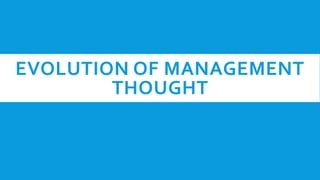This document summarizes the evolution of management thought from the late 19th century to present. It describes several approaches to management that developed over time in response to changing business needs and environments, including: scientific management, administrative management, human relations, behavioral science, management science, systems approach, and contingency approach. Each new approach built upon previous ones by further incorporating social, psychological, and situational factors.









































